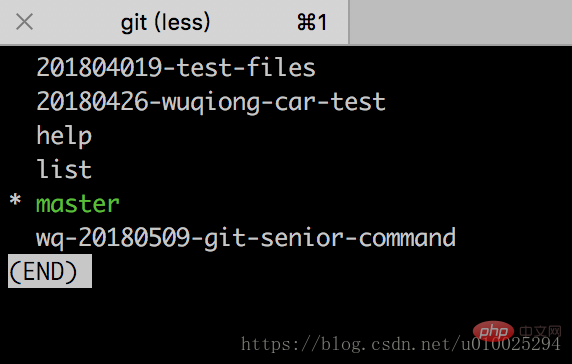How to delete remote branch in git
In git, you can use the "git push origin --delete branch name" statement to delete a remote branch; when deleting a remote branch, the local branch with the same name will not be deleted.

The operating environment of this article: Windows 7 system, git2.30.0 version, Dell G3 computer.
Delete remote branch: git push origin --delete [branchname]

prompts that a branch named 201804019-test-files has been deleted ,
Note: When deleting a remote branch, the local branch with the same name will not be deleted, so you need to delete the local branch with the same name separately
If the following error occurs:
error: unable to delete 'origin/xxxxxxxx-fixbug': remote ref does not exist
error: failed to push some refs to 'git@github.com:xxxxxxxx/xxxxxxxxxx.git'
Solution : git checkout xxxxx-fixbug Switch to the current branch, and then perform git push --delete origin origin/xxxxx-fixbug
The error will no longer occur.
Extended information:
2. View the local branch: git branch

with * in front Is the current branch
3. Delete the local merged branch: git branch -d [branchname] In some cases, you can use git branch -D [branchName] (you should pay attention to whether it has been merged when using it)

Prompt that a local branch named list has been deleted
4. Create a branch: git branch [branchname]
It should be noted that when creating a branch , there will be no prompt.
5. View all branches (including local and remote): git branch -a
6. Create a branch according to the specified version number: git checkout -b branchName commitId
7. Clean up local invalid branches (remote deleted branches that have not been deleted locally): git fetch -p
8. If there are too many branches, you can also use this command to perform branch fuzzy search: git branch | grep 'branchName'
git tag Delete the local tag and permanently delete the remote tag to prevent recovery-->
Recommended (free): Git
The above is the detailed content of How to delete remote branch in git. For more information, please follow other related articles on the PHP Chinese website!

Hot AI Tools

Undresser.AI Undress
AI-powered app for creating realistic nude photos

AI Clothes Remover
Online AI tool for removing clothes from photos.

Undress AI Tool
Undress images for free

Clothoff.io
AI clothes remover

AI Hentai Generator
Generate AI Hentai for free.

Hot Article

Hot Tools

Notepad++7.3.1
Easy-to-use and free code editor

SublimeText3 Chinese version
Chinese version, very easy to use

Zend Studio 13.0.1
Powerful PHP integrated development environment

Dreamweaver CS6
Visual web development tools

SublimeText3 Mac version
God-level code editing software (SublimeText3)

Hot Topics
 1382
1382
 52
52
 How to delete a repository by git
Apr 17, 2025 pm 04:03 PM
How to delete a repository by git
Apr 17, 2025 pm 04:03 PM
To delete a Git repository, follow these steps: Confirm the repository you want to delete. Local deletion of repository: Use the rm -rf command to delete its folder. Remotely delete a warehouse: Navigate to the warehouse settings, find the "Delete Warehouse" option, and confirm the operation.
 How to connect to the public network of git server
Apr 17, 2025 pm 02:27 PM
How to connect to the public network of git server
Apr 17, 2025 pm 02:27 PM
Connecting a Git server to the public network includes five steps: 1. Set up the public IP address; 2. Open the firewall port (22, 9418, 80/443); 3. Configure SSH access (generate key pairs, create users); 4. Configure HTTP/HTTPS access (install servers, configure permissions); 5. Test the connection (using SSH client or Git commands).
 How to deal with git code conflict
Apr 17, 2025 pm 02:51 PM
How to deal with git code conflict
Apr 17, 2025 pm 02:51 PM
Code conflict refers to a conflict that occurs when multiple developers modify the same piece of code and cause Git to merge without automatically selecting changes. The resolution steps include: Open the conflicting file and find out the conflicting code. Merge the code manually and copy the changes you want to keep into the conflict marker. Delete the conflict mark. Save and submit changes.
 How to submit empty folders in git
Apr 17, 2025 pm 04:09 PM
How to submit empty folders in git
Apr 17, 2025 pm 04:09 PM
To submit an empty folder in Git, just follow the following steps: 1. Create an empty folder; 2. Add the folder to the staging area; 3. Submit changes and enter a commit message; 4. (Optional) Push the changes to the remote repository. Note: The name of an empty folder cannot start with . If the folder already exists, you need to use git add --force to add.
 How to generate ssh keys in git
Apr 17, 2025 pm 01:36 PM
How to generate ssh keys in git
Apr 17, 2025 pm 01:36 PM
In order to securely connect to a remote Git server, an SSH key containing both public and private keys needs to be generated. The steps to generate an SSH key are as follows: Open the terminal and enter the command ssh-keygen -t rsa -b 4096. Select the key saving location. Enter a password phrase to protect the private key. Copy the public key to the remote server. Save the private key properly because it is the credentials for accessing the account.
 How to detect ssh by git
Apr 17, 2025 pm 02:33 PM
How to detect ssh by git
Apr 17, 2025 pm 02:33 PM
To detect SSH through Git, you need to perform the following steps: Generate an SSH key pair. Add the public key to the Git server. Configure Git to use SSH. Test the SSH connection. Solve possible problems according to actual conditions.
 How to add public keys to git account
Apr 17, 2025 pm 02:42 PM
How to add public keys to git account
Apr 17, 2025 pm 02:42 PM
How to add a public key to a Git account? Step: Generate an SSH key pair. Copy the public key. Add a public key in GitLab or GitHub. Test the SSH connection.
 How to use git rebase
Apr 17, 2025 pm 04:00 PM
How to use git rebase
Apr 17, 2025 pm 04:00 PM
git rebase is used to reapply commits to a new baseline to clean up history or relocate branches. How to use: Create a target branch Select the commit to be reapplied and execute the git rebase command, specify the target branch and commit scope to resolve conflicts, continue to reapply the remaining commit verification changes.




